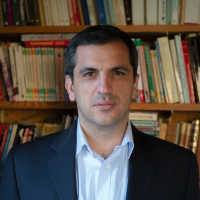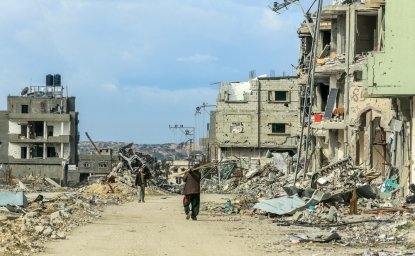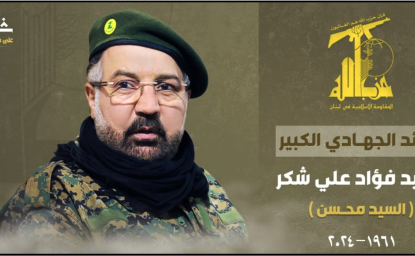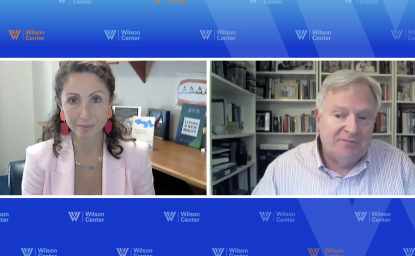The views expressed in these entries below are those of the authors and do not express the official position of the Wilson Center.
China Seizes the Opportunity to Criticize the US, Israel
Robert Daly on October 24
China condemned terrorism unequivocally—until Hamas attacked Israel. Then, not only did China’s Party media make no mention of Hamas or the October 7 slaughter, it pivoted immediately to condemnation of Israel and the United States.
Beijing now alternates between criticizing Jerusalem and Washington, and blandishments like that put forth by its Middle East envoy Zhai Jun: “China has no selfish interests on the Palestinian issue but has always stood on the side of peace, on the side of fairness and justice.” At home, the Chinese Communist Party (CCP) presents itself to the Chinese people as a conciliator, pointing to its facilitation of Saudi Iranian rapprochement and its publication of a “peace plan” for Ukraine.
Criticism of the United States, diplomacy by Hallmark Card, posturing before the Chinese people—that is what we should continue to expect of Beijing as this crisis unfolds. Most of China’s rhetoric in regard to Gaza will be inconsequential. China doesn’t offer real solutions and won’t take risks.
But in the broader MENA region and throughout the Global South, China’s support of Russia and Hamas and its calls for peace, development, and cultural sovereignty, however shallow and inconsistent, are increasingly influential. China has not yet—as is often warned—set up a new world order to compete with the established one. But it leads a loose, occasional, and growing coalition of nations that oppose the existing order and many of its underlying principles. This coalition often votes as a bloc in international organizations.
The longer the violence lasts, the stronger and more consequential this coalition will become. To counter that development, the United States and its allies must listen to the voices and address the problems of the Global South even as it tries to secure peace and justice in the Middle East.
The Cause of the War Was a US-Lead Struggle for Peace
Yair Hirschfeld on October 12
During the months, weeks and days before the Hamas terrorist attack, three complementary peace efforts were underway:
1. The USA, Israel and Saudi Arabia were negotiating a regional peace understanding; 2. The European Union started at the UN an intense dialogue with Saudi Arabia, the United Arab Emirates, Egypt and Jordan—combined with a parallel separate dialogue with Israel and the Palestinian Authority aimed at creating the national infrastructure for Palestine as part of a wider regional stability building effort; and 3. An unofficial Israeli-Palestinian dialogue aimed at reaching first territorial understandings for Palestinian state-building aimed to change realities on the ground, restart a process of mutual trust-building and pave the way for the renewal of a well thought out peace-building process.
On the global level, the multi-layered peace effort aimed at normalizing relations between Israel, Malaysia, and Indonesia would bring most of the Arab and Muslim world into the Abraham Accords. This effort threatened the interest of Hamas, particularly of its military wing, as well as the interests of Iran, its proxies, and Russia and became the motivation for Hamas to start this war.
Since 2007, Hamas has held their own people, Israel, and the region hostage. Their message of hate has helped to foil the peace efforts of 2007-2008, the 2014 framework agreement, and more lately also a preliminary understanding reached with Abu Ala in 2020-2021. The human cost of breaking the Hamas rule over Gaza will undoubtedly be very high, but still essential. We have to plan for offering humanitarian relief and assistance to the many displaced Palestinians.
It is essential to plan for the necessary peace building the "day after." Detailed plans are being prepared even now.
Regional Actors React and Prepare for the Long War
Raphael Cohen-Almagor on October 12
There is little doubt in my mind that Iran knew about and supported the attack. Iran has been a supporter of Hamas since its establishment. Whether Iran wishes to increase its involvement directly or via its proxies in Lebanon and Syria is presently an open question. President Biden warned Iran not to interfere and backed his words by sending carriers to the region.
Hezbollah, until now, reacted symbolically to show its solidarity with Hamas. Hezbollah’s firepower is significant. Its large rocket arsenal can target every place in Israel with greater precision than Hamas. Israel has mobilized 300,000 reservists to secure its borders in all directions. There is also fear that some Palestinian factions in the West Bank will exploit the situation to wage an attack.
Qatar, Turkey, and Egypt are willing to be involved in prisoner exchange negotiations between Israel and Hamas. One can presume that the three countries are concerned about the fate of the Gazans as they are facing heavy Israeli retaliation and yet another humanitarian crisis. Prime MInister Benjamin Netanyahu enlarged his coalition and included Benny Gantz in his war cabinet. A decision was made to open a ground offensive against Hamas aiming to destroy it completely. The war will be painful for Israel and Gaza. I asked Ambassador Karim Haggag, a career Egyptian diplomat for over 25 years and Director of the Middle East Studies Center at the American University in Cairo, whether Egypt will open its border to refugees from Gaza. His answer was NO. He explained that the first concern of the Egyptian government is its own security and safety, and it will not do anything that might put these considerations at risk.
Is there a silver lining? Perhaps the war will bring a positive change in Gaza and solve the Hamas problem, paving the way for a peaceful resolution with the PLO.
The War Dims Prospects for a Saudi-Israeli Deal
David Ottaway October 13
There is little love lost on Hamas among the biggest Arab states and, so far, the Arab street has remained remarkably restrained in showing support for the radical Palestinian faction. If Israel does manage to quickly wipe out Hamas, then at least one major obstacle to Saudi-Israeli normalization would be removed, making it easier for Saudi Arabia to strike a deal.
The prospects for this scenario, however, appear exceedingly dim. Rather, Israel is moving back into a political and military quagmire (which is why it decided to get out of Gaza in 2005). Hamas will likely suffer a military defeat eventually but inflict a heavy cost on Israeli occupying troops in the process. Israel may try to install the far more moderate Palestinian Authority (PA) in partnership with Israeli security forces, but the PA is militarily weak, its leadership decrepit, and its reputation badly tarnished in Gaza. If the fighting rages on for months, all Arab leaders are likely to come under increasing pressure from the street to show support for Hamas. Even if defeated militarily, Hamas will remain enormously popular across the Arab world: the new icon of Palestinian resistance to Israeli occupation.
In this atmosphere, it becomes extremely risky for Saudi Arabia to embrace Israel, even for its headstrong crown prince Mohammed bin Salman (MBS) who, until the Hamas incursion, was showing every sign of moving toward striking a deal with Prime Minister Netanyahu. Now, the Israeli leader will have scant popular or political support for making any concessions to the Palestinians. In any case, he will be too busy fighting for his political life to risk doing so. But even MBS has been insisting upon this in return for establishing diplomatic relations with the Jewish state.
The Crisis is the Outcome of Political Failure
Marina Ottaway October 13
The revulsion generated by Hamas’ attacks on Israeli settlements near Gaza should not distract attention from the fact that the crisis is the ultimate outcome of political failure.
Yes, Hamas is a terrorist organization and what it did in the settlements around Gaza cannot be condoned. But the attacks by Hamas were not unprovoked, as the Israelis claim. They came against the background of the untenable political situation in Gaza, the West Bank, and Israel. Gaza is a de facto open air prison, and Palestinians in Gaza and East Jerusalem are losing more and more land to Israeli annexations that the international community considers illegal. This is not a reason to give Hamas a pass, but a call for realism: in a stalled political situation, terrorism will continue to resurface. Even if Israel should succeed in decapitating Hamas—and this is unlikely—new organizations will take its place.
In the absence of a path to a political solution, terrorism among Palestinians is here to stay. Israelis can hope to avoid another gigantic intelligence failure, but not to achieve peace and stability. Is a political solution still possible? It is not clear. Israel has done its best for years to preclude the two-state solution by annexing land where a Palestinian state could be formed, but the international community, and particularly the United States must try at least once more to revive a political process.
Washington should not stand blindly behind Israel, particularly if its only reaction to the attacks is to bomb Gaza into rubble. The United States needs to find the courage to make it clear that it will provide military aid only if Israel engages in negotiations. The alternative to restarting a political process is a catastrophe in Gaza in which the United States will be de facto complicit.
Israel and Hezbollah Push the Envelope
Joe Macaron October 12
There is a growing concern that Hezbollah would open another front against Israel in parallel to this latest round of conflict in Gaza, which prompted the Biden administration to a carrier strike group to the Eastern Mediterranean as a deterrence to Iran and its allies. However, while Hezbollah and Israel have been pushing the envelope on the border, they have not stepped beyond the rules of engagement set since the conclusion of the July 2006 conflict between Israel and Lebanon.
The exchange of fire between Hezbollah and Israeli is expected to continue, as Hezbollah keeps Israel on its toes as a psychological deterrence to any ground invasion of Gaza. The Biden administration aims to have Iran and its allies idle, so Israel can have the space and time to retaliate against Hamas while Washington is trying to keep the Israeli government in check by not to going overboard in its reaction. The question is to what extent can Hezbollah be patient if an Israeli ground invasion begins, or the Palestinian death toll significantly increased in the next days and weeks.
It is a balancing act for all actors involved as south Lebanon and Gaza became somehow entangled. There has long been a myth about the idea of multiple fronts of Iranian proxies against Israel, but the connectivity of these fronts is not coherent, and each has its own calculations and local dynamics. Tensions are running high between Israel and Hezbollah, they are both in a state of alert wary of each other’s intentions and of every move, but they are still within the limits of their rules of engagement. Once the conflict in Gaza eventually winds down, Israel and Hezbollah will go back to business as usual, managing the United Nations Security Council Resolution 1701 that still stands until further notice.
The War Drives Disinformation Online
Yusuf Can October 13
In the aftermath of Hamas' attack, the digital landscape became the epicenter of a disinformation pandemic. One of the most deceptive forms of disinformation is manipulated video content. A video depicting a paragliding accident in South Korea was shared with the false claim that it displayed a Hamas terrorist struggling to enter Israel, getting stuck on an electrical wire and causing a fire.
Disinformation often relies on distorted footage deliberately used out of context. A recent case involved the distribution of videos supposedly portraying an Israeli air assault. However, these videos had been extracted from video games, notably Arma 3. The interesting twist is how swiftly this facade was unveiled. It wasn't just the game's developers who stepped forward but also a community of online users intimately familiar with the game.
Nevertheless, the insidious spread of disinformation and the manipulation of fabricated imagery continues to thrive. Those with insidious motivations went well beyond and created a fake White House announcement. An image resembling a screenshot of the supposed announcement suggested that Israel was being provided with $8 billion in aid and implied that this would hinder aid for Ukraine. Although the White House denied issuing any such statement, the fabricated image continued to spread. Mainstream media outlets also experienced their share of fake footage. A manufactured video claimed to show a BBC report declaring that weapons provided by NATO to Ukraine had been sold to Hamas. The circulation of the content continued to spread despite the BBC denying the existence of such a report. Lastly, the US Embassy in Lebanon had to put out a statement denying that the embassy was being evacuated after false reports claiming the opposite garnered attention online.
Can Diplomacy Help—A Little?
Haleh Esfandiari October 13
“Panic Grips Gaza as Israel Tells 1.1 million to Leave North,” said the headline in the New York Times this morning (Friday October 13). To the tragedy of the brutal massacre of Israeli civilians carried out by Hamas in its unprovoked attack on Israel last Saturday and deaths on the Palestinian side, a catastrophe of major proportions is looming. Israel is preparing what appears to be a ground invasion and bombing of Gaza, in prime minister Netanyahu’s words, to root out the Hamas leadership and is warning the resident to leave. But these families have nowhere to go. The crossing into Egypt is closed; a million people cannot possibly relocate to south Gaza.
Who is going to provide these Gazans with a safe corridor? All eyes are on the leaders if of the neighboring Arab states and in the Persian Gulf.
Some diplomacy is underway. In a step to ease tensions, the governments of Qatar and Egypt are trying to arrange a swap between Israelis taken hostage by the Hamas attackers and Gazans being held in Israel. Mohammad Bin Salman, the effective leader of Saudi Arabia talked for 45 minutes with the president of Iran, Ebrahim Raissi. Iran has influence with the Hamas terrorists, having for many years provided Hamas with weapons, money and training. Secretary of State Anthony Blinken, after a stopover in Israel, went to Qatar and Jordan to meet with the king and with the leader of the Palestinian Authority, Mahmoud Abbas, to seek a solution for the 300,000 Gazans already displaced and the population upheaval that is pending.
It is essential that these diplomatic efforts succeed. After the slaughter of Israelis by Hamas’ infiltrators, it seems a major Israeli offensive in Gaza is unavoidable, but diplomacy may avert the catastrophe looming for Gaza’s inhabitants.
The Collective Punishment of Palestinians in Gaza
Marwa Daoudy October 16
The killing of more than 1300 Israelis—soldiers, innocent children and civilians—by Hamas shocked Israel and the world. Israeli human rights organization B’Tselem characterized the government’s retaliation as “revenge policy in motion,” exacting collective punishment on all Palestinians in Gaza, where children make up half of the population. Netanyahu's plan to wipe out Hamas is waged with illegal weapons and war tactics, including cutting off all supplies of water, food and fuel, and reports of white phosphorous bombs. The death toll in Gaza is so far 2950, including 1030 children, 11,250 injured and 1 million displaced persons, and the numbers will likely grow exponentially with the imminent ground invasion by Israel.
No innocent civilian, especially children, should ever be a casualty of war. Since its 2005 withdrawal, Gaza has been bombed five times by Israel resulting in thousands of civilian casualties. For sixteen years, Gazans have been under a naval, air and land blockade. Meanwhile, Palestinians in the Occupied Territories face a daily regimen of brutality with 190 Palestinians killed since early 2023. Within the past week, 54 civilians have been killed and 1,100 wounded in the West Bank by the Israeli army and Jewish settlers.
It was wishful thinking to believe in a durable peace based on the Abraham Accords while maintaining the “world’s largest open-air prison” and ongoing Israeli occupation of the West Bank and East Jerusalem. President Biden declared “Israel has the right to defend itself and its people. Full stop,” but recently said reoccupying Gaza would be a “big mistake.” The use of total siege and forced displacement of civilians are considered war crimes. The United States should urgently impose a cease-fire and demand humanitarian corridors with medical aid, food, and water for civilians in the Gaza strip. Failure to act quickly would substantiate the words of Israel’s minister of defense of an Orwellian world that is divided between more equal and lesser “human animals.”
The views expressed in these entries are those of the authors and do not express the official position of the Wilson Center.
















